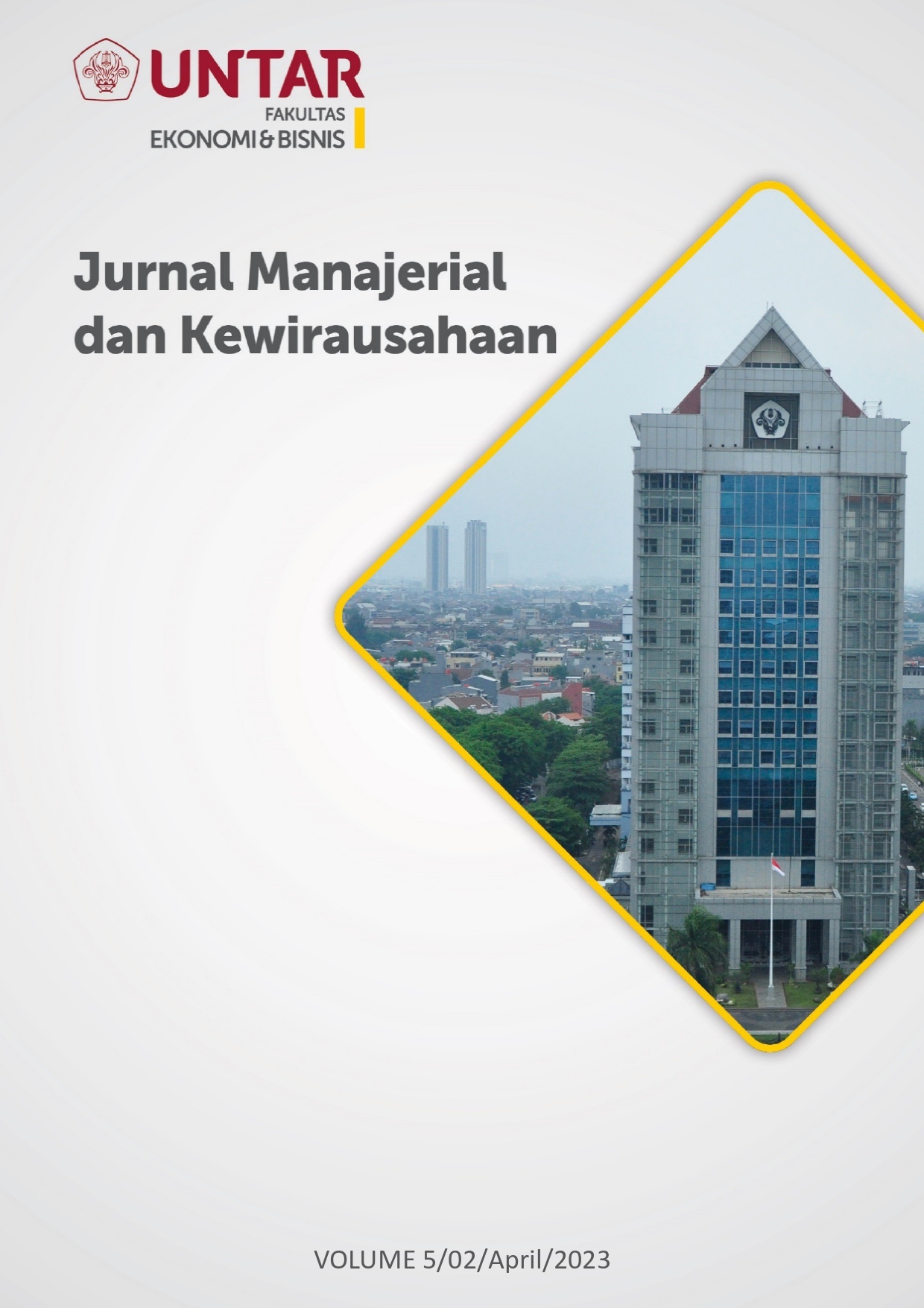Pengaruh Pendidikan Kewirausahaan, Dukungan Sosial, dan Efikasi Diri terhadap Intensi Berwirausaha Mahasiswa di Jakarta
Main Article Content
Abstract
Entrepreneurship education is an educational process that aims to develop the mindset, behavior, skills, and abilities to become an entrepreneur in the future. Then, social support is the presence of someone who is willing to provide comfort, attention, appreciation, and help for someone from individuals or groups. Social support can be obtained through various parties, namely life partners, family environment, peers, relationships, and community environment. The stronger the self-efficacy felt by an individual, then an individual has the effectiveness in implementing the ability to be entrepreneurial, strengthening the potential for entrepreneurship, stimulating enthusiasm, and confidence for entrepreneurship. Entrepreneurial intention is an individual's interest, desire, and availability for entrepreneurship as an option in a career, and is motivated to apply the field of entrepreneurship in the future. This study aims to determine the effect of entrepreneurship education, social support, and self-efficacy on entrepreneurial intention of students in Jakarta. This study uses a descriptive research design with a quantitative approach. The sampling technique used non-probability sampling, and the sample selection technique used purposive sampling. Data collection in this study using a questionnaire. The number of samples in this study involved 156 respondents. The data that has been collected is then tabulated, then processed using the SmartPLS version 4.0.8.5. The results of hypothesis testing show that entrepreneurship education, social support, and self-efficacy have a positive, and significant effect on the entrepreneurial intention of students in Jakarta.
Article Details
Section

This work is licensed under a Creative Commons Attribution-NonCommercial-ShareAlike 4.0 International License.
This work is licensed under a Jurnal Muara Ilmu Ekonomi dan Bisnis Creative Commons Attribution-ShareAlike 4.0 International License.,/p>
References
Ajzen, I. (1991). The Theory of Planned Behavior. Organizational Behavior and Human Decision Processes, 50(2), 179–211. https://doi.org/10.1016/0749-5978(91)90020-T
Ajzen, I. (2008). Consumer Attitudes and Behavior. Handbook of Consumer Psychology, 525–548.
Badan Pusat Statistik. (2022, May 9). Februari 2022: Tingkat Pengangguran Terbuka (TPT) sebesar 5,83 persen dan Rata-rata upah buruh sebesar 2,89 juta rupiah per bulan. Badan Pusat Statistik. https://www.bps.go.id/pressrelease/2022/05/09/1915/februari-2022--tingkat-pengangguran-terbuka--tpt--sebesar-5-83-persen.html
Biswas, A., & Verma, R. K. (2022). Engine Of Entrepreneurial Intentions: Revisiting Personality Traits with Entrepreneurial Education. Benchmarking, 29(6), 2019–2044. https://doi.org/10.1108/BIJ-11-2020-0607
Chang, J., & Rieple, A. (2013). Assessing Students’ Entrepreneurial Skills Development in Live Projects. Journal of Small Business and Enterprise Development, 20(1), 225–241. https://doi.org/10.1108/14626001311298501
Chen, Y., & He, Y. (2011). The Impact Of Strong Ties On Entrepreneurial Intention. Journal of Chinese Entrepreneurship, 3(2), 147–158. https://doi.org/10.1108/17561391111144573
Fayolle, A., Gailly, B., & Lassas-Clerc, N. (2006). Assessing the impact of entrepreneurship education programmes: A new methodology. Journal of European Industrial Training, 30(9), 701–720. https://doi.org/10.1108/03090590610715022
Gelaidan, H. M., & Abdullateef, A. O. (2017). Entrepreneurial Intentions Of Business Students In Malaysia: The Role Of Self-Confidence, Educational And Relation Support. Journal of Small Business and Enterprise Development, 24(1), 54–67. https://doi.org/10.1108/JSBED-06-2016-0078
Hair, J. F., Black, W. C., Babin, B. J., & Anderson, R. E. (2014). Multivariate data analysis. Pearson Education Limited.
Hair, J., Hult, T., Ringle, C., & Sarstedt, M. (2014). A Primer on Partial Least Squares Structural Equation Modeling. In Long Range Planning (Vol. 46, Issues 1–2). https://doi.org/10.1016/j.lrp.2013.01.002
Hockerts, K. (2018). The Effect of Experiential Social Entrepreneurship Education The Effect Experiential Social Entrepreneurship Education On Intention Formation In Students. Journal of Social Entrepreneurship, 9(3), 1–40. https://doi.org/10.1080/19420676.2018.1498377
Kemenkopukm. (2022, March 13). Tingkatkan Rasio Kewirausahaan, KemenkopUKM Siapkan Berbagai Program Strategis. Kemenkopukm. https://kemenkopukm.go.id/read/tingkatkan-rasio-kewirausahaan-kemenkopukm-siapkan-berbagai-program-strategis
Liñán, F., & Fayolle, A. (2015). A Systematic Literature Review On Entrepreneurial Intentions: Citation, Thematic Analyses, And Research Agenda. International Entrepreneurship and Management Journal, 11(4), 907–933. https://doi.org/10.1007/s11365-015-0356-5
Liu, X., Lin, C., Zhao, G., & Zhao, D. (2019). Research On The Effects Of Entrepreneurial Education And Entrepreneurial Self-Efficacy On College Students’ Entrepreneurial Intention. Frontiers in Psychology, 10(APR). https://doi.org/10.3389/fpsyg.2019.00869
Martin, N. & Widjaja O. H. (2019). The Effect of Entrepreneurial Self Efficacy And Entrepreneurial Creativity To Entrepreneurial Intention From Students In Tarumanagara University. Jurnal Manajerial dan Kewirausahaan, 1(4), 909-916. https://doi.org/10.24912/jmk.v1i4.6589
Mufti, O., Parvaiz, G. S., Qadus, A., & Afshan, R. (2019). The Entrepreneurial Intention of Business Students in Pakistan: The Role of Self-Efficacy, Business Education and Perceived Social Norms. Journal of Business & Economics, 11, 55–71.
Paray, Z. A., & Kumar, S. (2020). Does Entrepreneurship Education Influence Entrepreneurial Intention Among Students In HEI’s?: The Role Of Age, Gender And Degree Background. Journal of International Education in Business, 13(1), 55–72. https://doi.org/10.1108/JIEB-02-2019-0009
Puni, A., Anlesinya, A., & Korsorku, P. D. A. (2018). Entrepreneurial Education, Self-Efficacy And Intentions In Sub-Saharan Africa. African Journal of Economic and Management Studies, 9(4), 492–511. https://doi.org/10.1108/AJEMS-09-2017-0211
Sahban, M. A., Ramalu, S. S., & Syahputra, R. (2016). The Influence Of Social Support On Entrepreneurial Inclination Among Business Students In Indonesia. In Information Management and Business Review (Vol. 8, Issue 3).
Sandi, A., & Nurhayati, M. (2020). Effect of Entrepreneurship Education, Family Environment and Self-Efficacy on Students Entrepreneurship Intention.
Santos, S. C., & Liguori, E. W. (2020). Entrepreneurial Self-Efficacy And Intentions: Outcome Expectations As Mediator And Subjective Norms As Moderator. International Journal of Entrepreneurial Behaviour and Research, 26(3), 400–415. https://doi.org/10.1108/IJEBR-07-2019-0436
Sarafino, E. P., & Smith Timothy W. (2011). Health Psychology (7th ed.). John Wily & Sons, Inc.
Super, D. (2019). Donald Super Developmental Self-Concept. careers.govt.nz

